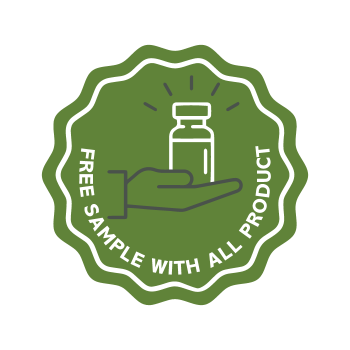ТХЦП
THCP (Тетрахидроканабифорол) е новооткрит канабиноид, който се среща естествено в следи в растението канабис. Той предизвиква вълнение в канабис общността поради своите уникални свойства и потенциална сила. Структурно подобен на THC (тетрахидроканабинол), основния психоактивен компонент в канабиса, се смята, че THCP е до 33 пъти по-силен от THC поради по-дългата си алкилова странична верига, която му позволява да се свързва по-силно с CB1 рецепторите в ендоканабиноидната система на тялото. Тази висока афинитетност на свързване прави THCP потенциално много по-мощен, създавайки интензивни ефекти дори при по-ниски дози.
Какво е THCP и как работи?
THCP беше идентифициран за първи път през 2019 г. от италиански изследователи, които анализираха проби от канабис за нови съединения. Откритието му разкри, че въпреки че е подобен на THC по структура, седемвъглеродната странична верига на THCP (в сравнение с петвъглеродната верига на THC) му позволява да се свързва по-ефективно с CB1 рецепторите в мозъка и централната нервна система. Тези рецептори играят ключова роля в това как тялото обработва болка, апетит, настроение и памет, поради което силното свързване на THCP с рецепторите може да усили тези ефекти.
Поради своята сила, THCP може потенциално да предложи уникални ползи и мощна алтернатива за опитни потребители, търсещи по-интензивни ефекти. Въпреки това, тъй като изследванията върху THCP все още са ограничени, неговите точни ефекти, терапевтичен потенциал и профил на безопасност все още се изучават.
Основни характеристики на THCP
- Повишена сила: Молекулярната структура на THCP му дава до 33 пъти по-висок афинитет на свързване в сравнение с THC, потенциално правейки го много по-мощен.
- Рядък канабиноид: THCP се среща естествено в следи в някои сортове канабис, така че не е толкова широко достъпен като други канабиноиди.
- Уникални свойства на свързване: Структурата на седемвъглеродната верига на THCP се свързва силно с CB1 рецепторите, които са свързани с психоактивните ефекти.
- Потенциални приложения: С продължаващи изследвания, THCP може да бъде изследван за терапевтични приложения, подобни на тези на THC, но при по-ниски дози.
Сравнение на THCP с други канабиноиди
Структурата и силата на THCP го отличават от други канабиноиди като THC и CBD. Докато THC се свързва ефективно с CB1 рецепторите, за да произведе психоактивни ефекти, THCP се свързва още по-силно, водейки до потенциално по-интензивни ефекти. Това означава, че дори малки количества THCP могат да създадат по-силен ефект в сравнение с еквивалентна доза THC. В контраст, CBD не се свързва директно с CB1 рецепторите и е непсихоактивен, осигурявайки релаксация без "високо".
Тъй като THCP е много по-силен, той може да има специфични приложения в продукти, предназначени за опитни потребители или в медицински формулировки, където силата е от съществено значение. Въпреки това, поради ограничените изследвания, много остава неизвестно за това как THCP взаимодейства с други канабиноиди и терпени.
Потенциални употреби и приложения на THCP
-
Управление на болката: Поради силното си свързване с CB1 рецепторите, THCP може да бъде изследвано по-нататък за приложения за облекчаване на болката, подобно на тези на THC, но при по-ниски дози.
-
Помощ за сън: Поради потенциала си за предизвикване на силна релаксация, THCP може да бъде ефективен в продукти, насочени към подпомагане на съня, въпреки че са необходими повече изследвания.
-
Терапевтични формулировки: Потенциалът на THCP може да го направи ценен за медицински формулировки в бъдеще, особено ако може да предложи ползи при по-ниски дози.
-
Рекреационни продукти за опитни потребители: THCP може да привлече опитни потребители на канабис, търсещи силни ефекти, но трябва да се подхожда с предпазливост поради силата му.
Свързани термини
- CB1 рецептори: Рецептори в ендоканабиноидната система на тялото, разположени основно в мозъка, отговорни за регулиране на ефекти като настроение, апетит и болка.
- Психоактивни ефекти: Ефекти, произвеждани от канабиноиди като THC и THCP, които променят възприятие, настроение и поведение.
- Алкилна странична верига: Част от молекулярната структура на канабиноид, която влияе на това как се свързва с рецепторите в тялото. Седемвъглеродната странична верига на THCP допринася за силната му афинитет към CB1 рецепторите.
Често задавани въпроси за THCP
Безопасно ли е използването на THCP?
Тъй като THCP е новооткрит канабиноид, изследванията за неговата безопасност са все още в начален етап. Потребителите трябва да бъдат внимателни, тъй като повишената потентност на THCP може да доведе до по-силни ефекти от очакваното.
Как THCP се различава от THC?
THCP има подобна структура на THC, но със седемвъглеродна странична верига, което му позволява да се свързва по-силно с CB1 рецепторите. Тази разлика в свързващия афинитет прави THCP потенциално много по-силен от THC.
Може ли THCP да се намери във всички сортове канабис?
Не, THCP се намира само в следи в определени сортове, което го прави по-рядък от други канабиноиди като THC или CBD.
Научете повече за канабиноидите и техния потенциал
С напредването на изследванията върху канабиноиди като THCP, нашето разбиране за тези мощни съединения ще се разшири, предлагайки нови прозрения за техните ползи и приложения. Ако се интересувате от изследване на канабиноиди извън THC и CBD, изследвайте гамата на Pharmabinoid от канабиноиди продукти и открийте как могат да подкрепят вашата уелнес рутина.
TryPharma
Обадете ни се или ни изпратете имейл за повече информация

Безплатна проба
Открийте ползите от нашите продукти от първа ръка, като посетите нашия уебсайт, за да получите своя ексклузивен TryPharma код. Когато направите поръчка с този специален код, не само ще осигурите желаните продукти, но също така ще включим безплатна проба с всяка покупка. Тази възможност ви позволява да изпитате качеството на нашите предложения, преди да се ангажирате с основната доставка. Нашата цел е да гарантираме, че сте напълно удовлетворени от избора си, и този процес предоставя безрисков начин за изследване на нашата обширна гама от продукти. Свържете се с нас днес, за да започнете и направете първата стъпка към възнаграждаващо изживяване с нашите първокласни предложения.

Застраховка за доставка
Когато закупувате на едро CBD изолати, масла и други продукти от нас, вашата пратка е напълно застрахована от нас без допълнителни разходи за вас. Използваме реномирани транспортни компании като FedEx и UPS за транспортиране, като управляваме застрахователното покритие сами, за да осигурим всяка пратка от нашия склад до вашата врата. В TryPharma, ние сме ангажирани с насърчаването на бизнес растежа, като предлагаме безрискова услуга за търговия на едро. В малко вероятния случай на проблем с доставката, гарантираме възстановяване на сумата в рамките на пет работни дни от датата на потвърждение на инцидента. Нашият всеобхватен подход ефективно елиминира 99.9% от всички потенциални рискове, свързани с доставката на едро CBD, осигурявайки вашето пълно спокойствие.

30-дневно връщане
Каним ви да изпробвате безплатната проба, включена с вашата поръчка, преди да отворите основната доставка. Ако качеството не отговаря на вашите очаквания, можете да се възползвате от нашата 30-дневна политика за връщане. Тази политика ви позволява да върнете продукта в рамките на 30 дни за пълно възстановяване на сумата, като гарантира вашето пълно удовлетворение. Свържете се с нас днес, за да изследвате нашата изключителна гама от продукти и да изпитате нашата всеотдайна клиентска услуга.
Канабиноидни изолати
-
CBD изолат - Канабидиол
Обичайна цена From €24.99 to €369.99Обичайна ценаЕдинична цена / за€0.00Цена при разпродажба €24.99 -
CBG - Канабигерол
Обичайна цена From €49.99 to €799.99Обичайна ценаЕдинична цена / за€0.00Цена при разпродажба €49.99 -
CBN - Канабинол
Обичайна цена From €79.99 to €1,299.99Обичайна ценаЕдинична цена / за€0.00Цена при разпродажба €79.99 -
CBC - Канабихромен
Обичайна цена From €159.99 to €4,999.99Обичайна ценаЕдинична цена / за€0.00Цена при разпродажба €159.99 -
CBDV - Канабидиварин
Обичайна цена From €13.99 to €3,999.99Обичайна ценаЕдинична цена / за€0.00Цена при разпродажба €13.99 -
Изолат на канабицитран - CBT
Обичайна цена From €49.99 to €4,449.99Обичайна ценаЕдинична цена / за€0.00Цена при разпродажба €49.99 -
Канабидиолова киселина - CBDA
Обичайна цена From €49.99 to €1,499.99Обичайна ценаЕдинична цена / за€0.00Цена при разпродажба €49.99 -
Канабигеролова киселина - CBGA
Обичайна цена From €59.99 to €1,749.99Обичайна ценаЕдинична цена / за€0.00Цена при разпродажба €59.99
Колекции
-

Психоактивни екстракти
Отключване на потенциала на психоактивните екстракти и течния канабис на B2B пазара...
-

Търговия на едро с CBD масло в Европа
В Pharmabinoid сме посветени на показването на лечебните възможности на канабиноидите, за...
-

CBD вейпове
Защо толкова много хора се наслаждават на CBD вейпове? CBD е екстракция...
-

Козметика с CBD
През последните години разработихме различни козметични продукти на основата на CBD и...
-

Дестилати от CBD
Положителни точки за CBD дестилати CBD дестилат е продукт, който съдържа CBD,...
Блог публикации
Покажи всички-

"Търговия на едро с D9-THCB: Навигиране на възм...
В непрекъснато развиващия се пейзаж на индустрията за канабис, търговията на едро с D9-THCB предизвика интерес сред европейските дистрибутори, които се стремят да обслужват нарастваща клиентска база, заинтересована от нови...
"Търговия на едро с D9-THCB: Навигиране на възм...
В непрекъснато развиващия се пейзаж на индустрията за канабис, търговията на едро с D9-THCB предизвика интерес сред европейските дистрибутори, които се стремят да обслужват нарастваща клиентска база, заинтересована от нови...
-

"Търговия на едро с D9-THCH: Отключване на възм...
В постоянно развиващия се свят на канабиноидите, фокусът върху D9-THCH на едро е привлякъл интереса на мнозина в индустрията. Този по-малко известен компонент, Делта-9-THCH, отразява някои характеристики на THC, но...
"Търговия на едро с D9-THCH: Отключване на възм...
В постоянно развиващия се свят на канабиноидите, фокусът върху D9-THCH на едро е привлякъл интереса на мнозина в индустрията. Този по-малко известен компонент, Делта-9-THCH, отразява някои характеристики на THC, но...
-

"Изследване на възможностите в търговията на ед...
В света на канабиноидите, оставането на преден план с нововъзникващи съединения може да бъде променящо играта. Възможностите за продажба на едро на D9-THCPO привлякоха значително внимание както от дистрибутори, така...
"Изследване на възможностите в търговията на ед...
В света на канабиноидите, оставането на преден план с нововъзникващи съединения може да бъде променящо играта. Възможностите за продажба на едро на D9-THCPO привлякоха значително внимание както от дистрибутори, така...









